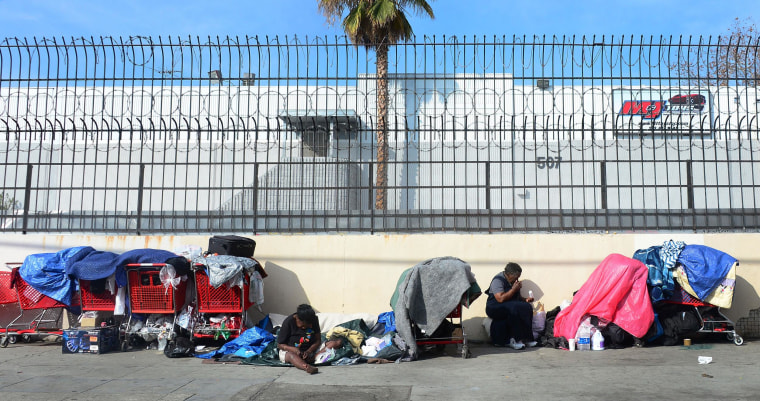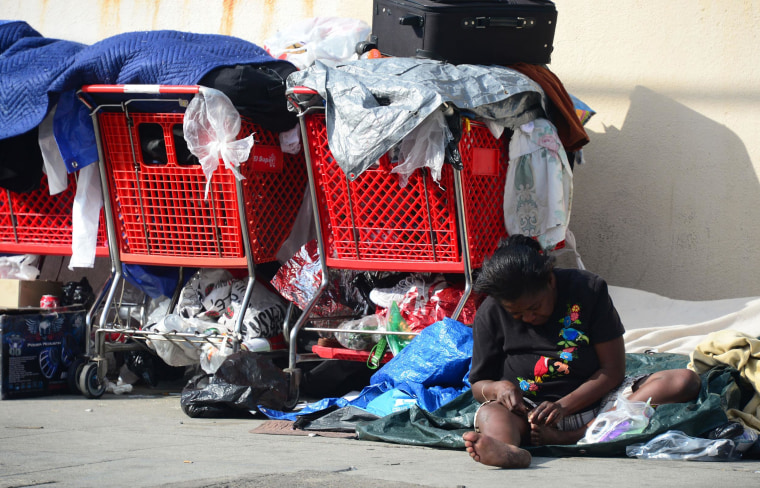Is It Against the Law to Feed the Homeless on the Streets in Florida
Fort Lauderdale, Florida, approved restrictions overnight on churches and other charitable organizations that feed the homeless, becoming the latest city to impose limits on meals offered by private groups in public places.
The regulations require groups handing out food to homeless to be at least 500 feet away from residential properties. They limit feeding sites for homeless to one in any given city block, and prevent feeding sites from being within 500 feet of each other.
It's the fourth law Fort Lauderdale has passed this year concerning the homeless, according to the Sun Sentinel. The others ban the homeless from asking for money at busy intersections, and make it illegal to sleep and store belongings on public property.
Across the country, legislative action criminalizing the distribution of food to homeless people is picking up speed. More than 30 cities have passed or are considering such bans; of those, more than 20 have restricted food-sharing since January 2013 alone, according to a study published earlier this week by the D.C.-based National Coalition for the Homeless.

Advocates of the legislation say allowing ministries and others to hand out meals aggravates homelessness because it lures homeless people away from city-run programs.
But Michael Stoops, community organizer at the National Coalition for the Homeless, argues that the cities that have or are trying to pass these laws — Seattle, Los Angeles, Phoenix, Dallas, and Philadelphia, to name a few — are doing it because they want to scrub their neighborhoods clean of homeless people, making them more appealing to businesses.
"Economic development and tourism don't mesh well with homeless folks and the agencies that serve them," Stoops said. "That's happening throughout the country and there are always efforts to try to get the shelters to move to the other side of town. But even if they did that, there would still be homeless folks in the downtown areas, because many of the government agencies, social security, welfare, food stamps, are located in the downtown areas."
Many of the cities that have attempted to restrict, ban or relocate food-sharing are clustered in Florida and southern California — places that may be more attractive to the homeless because of warm weather, according to Robert Marbut, a national homeless expert and consultant.
"Homelessness is a very complex issue that's very much intertwined with mental health and substance abuse, largely, and to some extent, job readiness, being able to hold a job. That's why these things simply don't work."
"Because we've had two really bad winters in a row, a lot of people move back and forth, but these last two years people moved to southern California, south Texas, and all over Florida. They moved south and did not go back. So Florida has about 10 percent more homeless in the last twelve months than it did in the prior twelve months, statewide," he said.
But preventing private groups from feeding homeless people in public is just a "gimmick" that doesn't address the root causes of homelessness, Marbut, who has worked with dozens of cities to address homelessness, said.
"Homelessness is a very complex issue that's very much intertwined with mental health and substance abuse, largely, and to some extent job readiness, being able to hold a job. That's why these things simply don't work."

Commissioners in Fort Lauderdale who passed the ordinance early Wednesday morning were commended by Ron Book, a city lobbyist.
"Feeding people on the streets is sanctioning homelessness," Book told the commissioners, the Sun Sentinel reported. "Whatever discourages feeding people on the streets is a positive thing."
Marbut conceded that "feeding keeps people from going into recovery," but he said that neither giving food to a person on a park bench nor laws that ban the practice are solutions to the problem.
"Street-feeding is bad and it's wrong, but the best way to do it is to encourage street-feeders to change their location and their time to align with holistic services, rather than trying to outlaw them," he said. He suggested churches and charities be permitted to move their meal programs to shelters or other places that addresses mental health issues and substance abuse, instead of just imposing restrictions on them.
Besides weather, numerous other factors have contributed to a rise in homelessness, Marbut said, such as the rental housing market bouncing back, which has squeezing people out of affordable housing, and combat military vets returning home with mental health issues.
Whatever the cause, placing restrictions on meal programs won't solve anything, Stoops said.
"It will mean that people will have less food in their belly, less options. Services for the homeless are not all in one location; you have to go from Point A to Point B to Point C," he said. "Having groups bring food meets the hunger issue, but it also links people up with services."
Source: https://www.nbcnews.com/news/us-news/fort-lauderdale-latest-city-restrict-feeding-homeless-n231381
0 Response to "Is It Against the Law to Feed the Homeless on the Streets in Florida"
Post a Comment